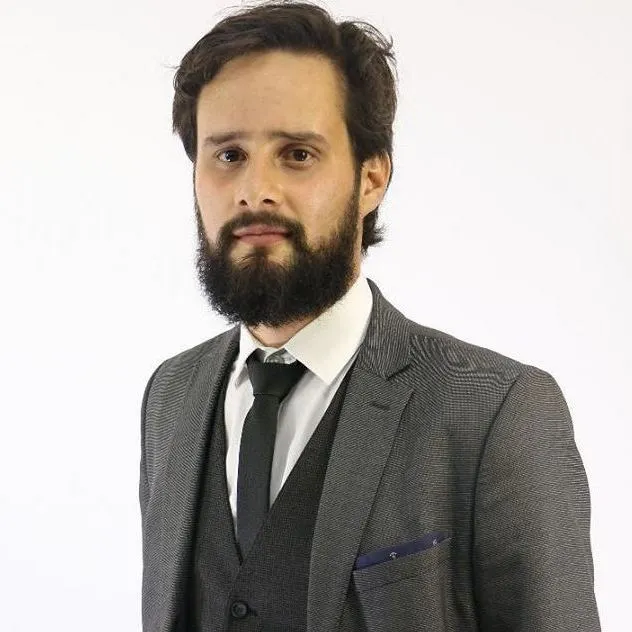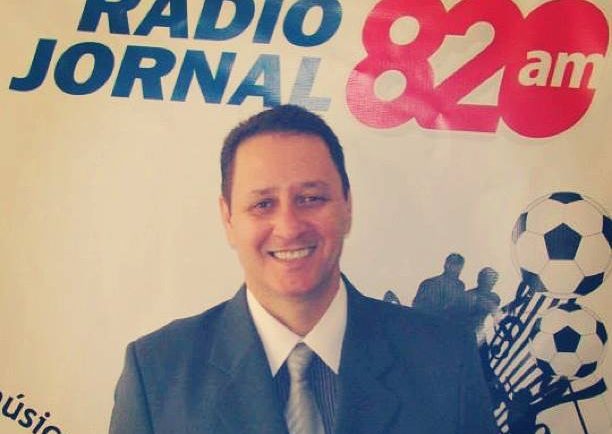On July 5, 2012, Valério Luiz de Oliveira Filho was at home waiting for his father to arrive for lunch when he received a phone call from his stepmother. “Go to the broadcaster,” she told him through tears, he said. “Your father has been shot.”
His father, Valério Luiz de Oliveira, a well-known sports journalist in the city of Goiânia, the capital of the central Brazilian state of Goiás, had been driving home after finishing his daily broadcast at Rádio Jornal 820 AM when he was shot several times and killed.
An investigation by the Goiás state civil police, concluded in February 2013, identified five men as the alleged perpetrators. Among those was alleged mastermind Maurício Borges Sampaio, then the former vice president of local football club Atlético Goianiense, who was accused of ordering the killing in retaliation for Oliveira’s critical reporting.
Less than a month before the murder, Atlético’s directors had sent a letter to broadcasters PUC TV and Rádio Jornal, Oliveira’s employer, informing both outlets that their employees were prohibited from entering the club’s premises. The letter described Oliveira as a “persona non grata.”
In March 2013, the Goiás state public prosecutor charged all five men for their alleged roles in Oliveira’s murder. In August 2014, the 2nd Criminal Court in Goiânia decided the accused should face trial by jury. Since then, however, multiple appeals from defense attorneys, as well as decisions by the Goiás Court of Justice to postpone the trial several times, have delayed the trial, as CPJ has reported. The trial is now scheduled to begin on May 2, 2022.
CPJ emailed Atlético Goianiense’s press office but did not receive any reply. Luiz Carlos da Silva Neto, Sampaio’s lawyer, replied to CPJ’s emailed request for comment by sending three legal petitions, but did not answer CPJ’s questions. Sampaio has denied involvement in the crime.
Valério Luiz Filho, a lawyer, is acting as assistant to the prosecution in his father’s case, as allowed by Article 268 of Brazil’s Penal Code. In a video interview, he spoke to CPJ about his decade-long fight for justice and expectations for the upcoming trial.
The interview has been edited for length and clarity.

What are some memories you have of your father’s work as a journalist?
Valério Luiz Filho: The journalistic career in our family began with my grandfather, Manoel de Oliveira. He was born in the countryside of Goiás, started his life as a merchant and, to attract customers, narrated football games outside the stores where he worked. Then, he started helping my great-grandmother in a restaurant that was close to broadcaster Rádio Carajás. He used to tell journalists who had lunch there that he knew how to narrate a football game. One day, one of the journalists invited my grandfather to go to the broadcaster, and Rádio Carajás hired him as a reporter.
Years later, my grandfather moved to Goiânia with his family. They settled in the area of the city known as Setor Campinas, which is where Atlético Goianiense’s stadium is located. My father was raised there, grew up as an Atlético fan, and even played in Atlético’s youth league, but he didn’t become a professional.
My grandfather became the head of the two biggest sports journalist teams of two radio broadcasters, and my father grew up in this environment. My father’s first job was as a “wire puller,” which is a profession that no longer exists. I remember this when I was a kid. Around the football field at the end of the game, there was a tangle of wires from the broadcasters, and someone had to pull the wires so the journalists could move around. My dad did that.
When my father was murdered, he had had a 30-year-long career, most of it in sports journalism, and for a large part of it he worked with my grandfather. In 2011, my father decided to go work for broadcaster PUC TV, where he thought he could develop a more independent line of critical journalism. That’s what he wanted to do. He was super excited about the job. But in 2012, he started saying that he no longer wanted to work as a journalist, that he no longer wanted to be a football commentator. That was a very rapid and radical change. I think he already imagined that something could happen, but he probably didn’t imagine that it would be a mini war operation.
The man accused of being the mastermind of your father’s murder was vice president of Atlético. How do you feel about this?
It’s a really bad feeling. After the murder, he was president of Atlético twice and is still there today as a board member. When Atlético is asked about this, they say that the club has nothing to do with it. They ask for respect for the club’s history. They make a distinction between the people and the institution. But for me it’s a very strange feeling.
You are a lawyer, and you are acting as an assistant to the prosecution of those accused of killing your father. Why did you decide to do this?
I went there to the crime scene and saw my dad inside the car before the firefighters pulled out his body. In situations like this, you make certain decisions. One of the decisions I made was that whoever was responsible for that would have to pay. And the way I can collaborate to make that happen is to act in the judicial process as an assistant to the prosecution.
A homicide case that does not have a family representative as an assistant to the prosecution is less likely to make it through the justice system, especially depending on the defendant’s social status. Criminal accountability of those in power is difficult, and having victims’ families assisting the prosecution is fundamental.
Your grandfather was also a journalist. How did your father’s killing affect the two of you and your relationship?
We developed a very close relationship in the fight for justice, a relationship of companionship around a common goal that was as dear to him as it is to me. Part of the visibility the case had is due to my grandfather and his ability to mobilize people and the press. My grandfather died last year of cancer, without seeing justice done. I know it was his wish that I continue what we started.
Your father’s killing has received significant media coverage in Brazil. What has been the impact of such coverage?
My grandfather had about 50 years working as a journalist, and my father, 30. They were very well known here, so the crime had major repercussions. The press coverage of my father’s murder has been pivotal. Nobody commits a crime like that expecting to be arrested. They do it because they think they’ll get away with it. I imagine they [the killers] assumed that, with time, the case would be forgotten.
In Brazil, we live with tragedy every day and, somehow, this anesthetizes people’s sensitivity. I think my father’s killers were counting on it, that his death would be “the tragedy of the day” and that, the next day, no one would talk about it anymore. But that’s not what happened.
What has this decade-long struggle for justice been like?
It’s been 10 deeply stressful years. It feels like I’m in a never-ending nightmare. Every year has been troubled and marked by our efforts for the case to be solved and go to trial. Every attempt by the accused to delay the trial creates tension. Mobilization must be permanent. At every appeal from the defense, we are tense and afraid that the trial will be postponed again, that there will be no justice.
From the beginning, our only weapon was visibility. When you shine a light, when more people are looking, it becomes more difficult for someone to act in the private interest rather than the public interest. Our strategy from the beginning was for everything to be done in the open. When things happen in the open, public officials act the way the law determines.
After almost 10 years since the killing, the trial is now scheduled for May 2. What do you hope will happen?
There are a lot of expectations about the development of the case and all the mobilization that has been necessary for it to go to trial. The result will have an impact on society.
If the accused go to trial and are convicted, the message is that mobilizing for justice is difficult, but it’s worth it. If they are not convicted, the message is that it’s better not to mess with certain types of people here.
Justice in this case is in the public interest. The resolution of this case could bring greater protection for freedom of expression and the press, or it could bring greater fear, depending on the outcome.
I hope that the defense lawyers’ attempts to delay the trial do not succeed, and that the trial actually takes place on May 2.
Ideally, what would justice look like for you?
My father was killed in front of his workplace, in broad daylight, as if he were nothing, someone who could be discarded. Justice in this case means imposing on those people who committed the crime the acknowledgement of the value of what they took.
It’s as if society, the law, would tell them: What you have destroyed, these people you destroyed, that matters. Justice would be for them to realize the value of what they took away from us.
